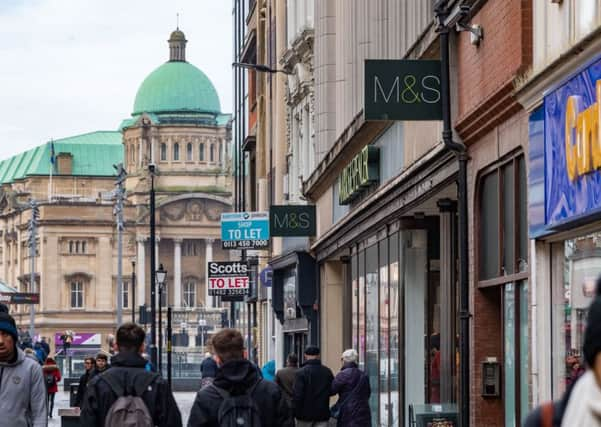Four ways to help save our high streets and town centres – British Retail Consortium boss Helen Dickinson


But running a close second for every retailer I talk to is business rates, which has not been getting the political attention that this vital issue deserves.
Advertisement
Hide AdAdvertisement
Hide AdThat’s why the British Retail Consortium (BRC), representing the UK’s retail industry, co-ordinated a letter to the Chancellor this week, signed by over 50 CEOs from retailers and trade bodies, urging him to tackle the Byzantine burden of this broken tax.


The fact that we persuaded so many major national companies, from Asda to WH Smith, to come out to publicly support this call shows just how widespread the frustration with the current system is.
Advertisement
Hide AdAdvertisement
Hide AdBusiness rates are a tax that businesses pay to occupy their shop, factory, office or warehouse.


They are fixed regardless of whether a business is making a profit or loss.
To calculate what each business owes, the Government multiplies the estimated rent by a percentage.
Advertisement
Hide AdAdvertisement
Hide AdIn England that proportion has risen from 34p in the pound in 1990 to 50p today, a 50 per cent rise. That means that for every £100 a shop pays in rent, it must pay another £50 in rates on top. This relentless increase is simply unsustainable.


Everybody recognises that vibrant high streets and town centres are essential in creating jobs and sustaining the economic and social life of our communities.
We can all see how the high street is transforming as people’s shopping habits change. We are all shopping online more and so there will be fewer shops in the future.
But there will always be shops and retailers want to invest locally and to create shopping experiences fit for the 21st century. However they are often being held back by the sheer weight of business rates.
Advertisement
Hide AdAdvertisement
Hide AdFor too long, the onerous rates burden has acted as a brake rather than an accelerator on the economy.
Indeed, the only things that it has accelerated are job losses and shop closures: there were almost 80,000 fewer retail jobs in the first quarter of 2019 compared to the same time in 2018.
In July, the number of empty shops rose to a four-year high, with more than one in 10 stores now vacant.
Business rates aren’t the only cost pressure bearing down on the industry, but I’ve lost count of the number of times that retailers have told me that the rates bill is often the tipping point between a shop carrying on trading or closing down, with all the knock-on impact on the rest of the local high street and community.
Advertisement
Hide AdAdvertisement
Hide AdThe retail industry accounts for five per cent of the UK’s economy, but it pays 10 per cent of all business taxes and 25 per cent of all business rates, and so rates are a tax that disproportionately targets shops.
To be fair, Chancellors over the years have recognised that the business rates system is flawed.
Tax reliefs have been created for things as diverse as empty properties, charity shops, smaller shops, local newspaper offices and even public toilets.
Individually justifiable, but over time they’ve created a confusing mish mash of reliefs that makes the system hard to understand and expensive to navigate. Any system that requires so many sticking plasters and so much translation is clearly in need of wholesale reform.
Advertisement
Hide AdAdvertisement
Hide AdWe have called for business rates to be reformed as part of a fundamental review of the whole suite of business taxation to make the tax system fit for the 21st century.
That won’t happen overnight, so in the meantime, we are calling on the Chancellor to do four specific things that will make a real difference to businesses:
Freezing the annual rise in rates;
Creating incentives for investment in property;
Getting rid of the bureaucracy of the appeal system:
Scrapping the bizarre requirement that results in shops in Yorkshire subsidising the rates bills of say a bank in London.
We don’t think there should be an online sales tax as this would punish modern shopping habits.
Advertisement
Hide AdAdvertisement
Hide AdInstead our proposals can be implemented relatively quickly, and while some will cost the Treasury some money, in the longer term they will increase investment, increase productivity and reduce regional disparities.
The Prime Minister said recently that the Northern Powerhouse rail link would ‘‘turbo charge’’ the regional economy.
Business rates reform is perhaps less eye-catching than major rail projects but fixing this broken tax would also give the economy in the North and Midlands a welcome boost, supporting high streets and town centres in every community.
It’s not the whole answer, but it is a vital first step, and I hope the Chancellor heeds our call.
Helen Dickinson is chief executive of the British Retail Consortium.